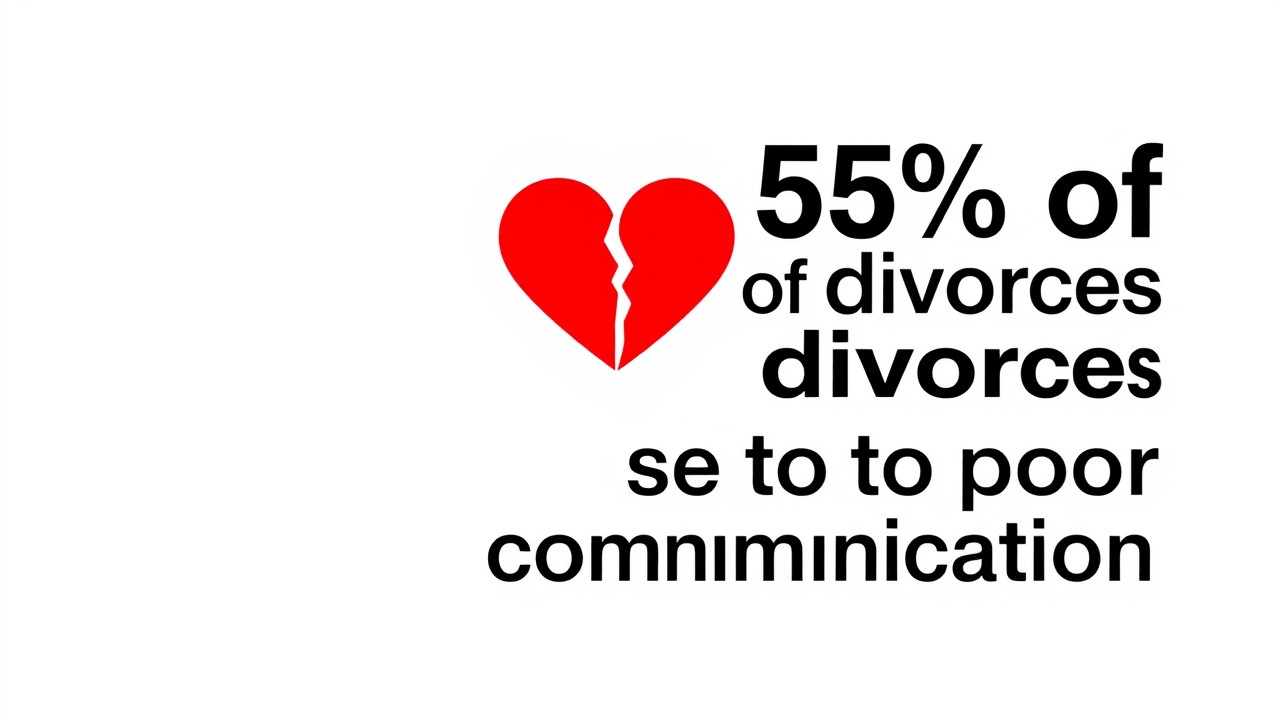Most couples don’t break up because of cheating or money… but because they never learned how to talk.
💥 "We Just Don't Talk Anymore…"
She said it softly, eyes heavy.
He didn’t look up — just stared at the floor.
They were married for 9 years. No abuse. No affair. No big drama.
Just… silence.
And that silence had become louder than words.
Sadly, this story is more common than we think.
Couples still love each other — but can’t connect anymore.
Why?
Because no one ever taught them how to communicate.
📉 The Shocking Truth: 65% of Divorces Happen Due to Poor Communication
- Not because of infidelity.
- Not because of finances.
- Because of something as fixable as communication.

Let that sink in.
⚠️ 7 Ways Communication Quietly Destroys Relationships
Here’s what most couples never realize until it’s too late:
1. Silence Replaces Sharing
You stop talking about your day.
Then your thoughts.
Then your dreams.
At first, it’s just fatigue. Later, it becomes habit.
And without even realizing, conversations turn into routines — and connection fades into silence.
2. Hurt Feelings Stay Unspoken
You get hurt — but you don’t say it.
Not because you don’t care, but because you don’t want another fight.
So you say, “I’m fine.” Again and again.
The resentment builds quietly, until it turns into emotional distance.
3. Listening Turns into Defending
You stop hearing what they’re really saying — because you’re too busy preparing your response.
Even simple conversations feel like attacks.
Instead of “I understand,” it becomes “You always…” or “You never…”
And suddenly, every discussion feels like a battlefield.
4. Ego Takes Over Empathy
You’d rather win the argument than understand their pain.
Saying “I was wrong” feels heavier than it should.
And in that moment, closeness takes a backseat to control.
The bond weakens — not from hatred, but from hardened pride.
5. Affection Turns into Assumption
You assume they know you love them.
You assume they’re okay because they haven’t complained.
But love isn’t about assumptions — it’s about showing up.
And when words and gestures disappear, doubt quietly takes their place.
6. Vulnerability Feels Unsafe
You want to be honest, but you fear being misunderstood.
So you keep things to yourself.
Not to deceive — but to protect.
Yet the more you hide, the less your partner sees the real you.
7. Nobody Knows How to Fix It
You both sense something’s off.
But no one knows what to say, or how to start.
So you carry on — pretending, avoiding, hoping it’ll pass.
Until one day, the silence feels louder than the love.
Sound familiar?
🧠 Where Does This Come From?
We weren’t raised in homes that taught emotional communication.
Many of us grew up hearing:
- “Stay quiet = respectful”
- “Don’t talk back”
- “Crying means weakness”
So now, as adults:
- We avoid hard conversations
- We bottle things up
- We speak in anger instead of honesty
- And slowly, love starts to feel like effort.

💬 What It Looks Like at Home
- Frequent misunderstandings
- One-word answers
- “I’m fine” masks
- Fights over nothing
- Feeling lonely… even when you’re together
This is how relationships fall apart — not in one moment, but in a thousand unsaid ones.
💔 A True Story: A Divorce That Was Never Meant to Happen
A few months ago, during one of our mental health awareness events, I met a woman I’ll never forget.
She was sharp, confident, and had spent years working as a scout — actively involved in community service and guiding others. Outspoken and energetic, she seemed like someone who had it all together.
But as the workshop progressed, something shifted.
She got emotional. Her voice began to crack. And in front of the group, she started sharing deeply personal things — about her marriage, her in-laws, and the loneliness she felt at home.
She spoke of years of pain, of feeling unsupported, and of how her husband never defended her. She said she was planning to file for divorce.
At first, I believed everything she said. Her words carried weight. Her frustration was real. But something about how often she repeated the word “divorce” made me pause.
It wasn’t just a decision — it sounded like a cry for someone to validate her choice.
After the session, I gently pulled her aside.
I asked her if she’d be willing to share more with me, just one-on-one. And she did. She poured her heart out. Everything she said made sense — from her point of view. But something inside me wanted to hear the other side, too.
So I asked her, “Would your husband be open to speaking with me?”
To my surprise, she said, “He’s actually nearby — waiting for me in a temple down the road. He usually does that during my workshops.”
That one sentence told me a lot.
We called him in.
When he entered, I saw a man who was the complete opposite of his wife. Gentle. Quiet. A little shy. He barely made eye contact at first. But he wasn’t rude — just… unsure of himself.
We sat together, and I asked him to share his side.
He didn’t blame. He didn’t interrupt. He just spoke — slowly, thoughtfully. And the more he spoke, the more I realized: this wasn’t a bad man. This wasn’t a man trying to hurt his wife.
This was a man who simply didn’t know how to express himself.
Years of emotional silence had built up between them — not because they didn’t love each other, but because they didn’t speak the same emotional language.
She was fiery, expressive, direct.
He was thoughtful, internal, soft-spoken.
And between those two extremes, communication had collapsed.
I looked at both of them and said, “You don’t have a relationship problem. You have a communication gap.”
They both stared at me.
I told them about our Effective Communication Mastery System — not as a pitch, but as a path. I told them, “Join our classes. Learn to speak — and more importantly, to listen. Pay only if you feel the change.”
They were hesitant, but something in them said yes.
And over the next few weeks, they showed up. Together.
- They practiced the tools.
- They learned about speaking with clarity.
- They learned how to listen without reacting.
- They saw themselves — and each other — in a new light.




